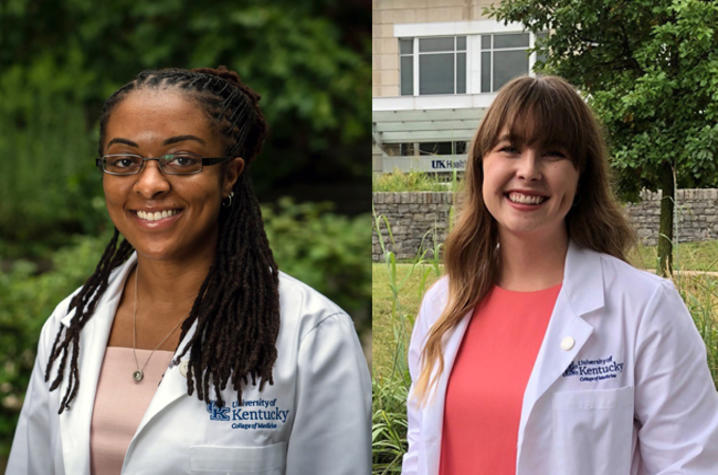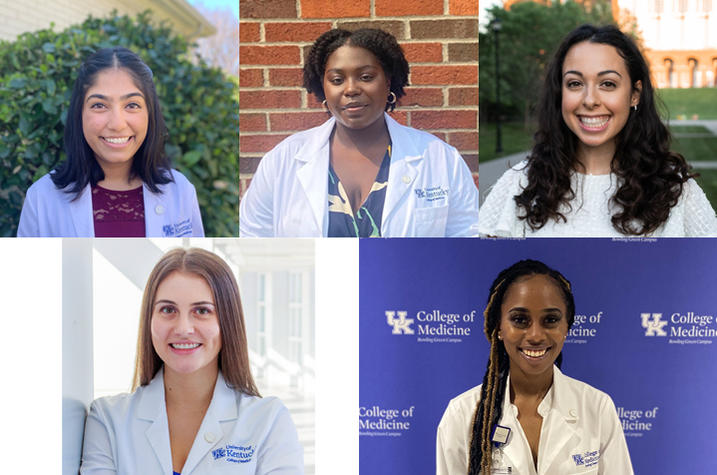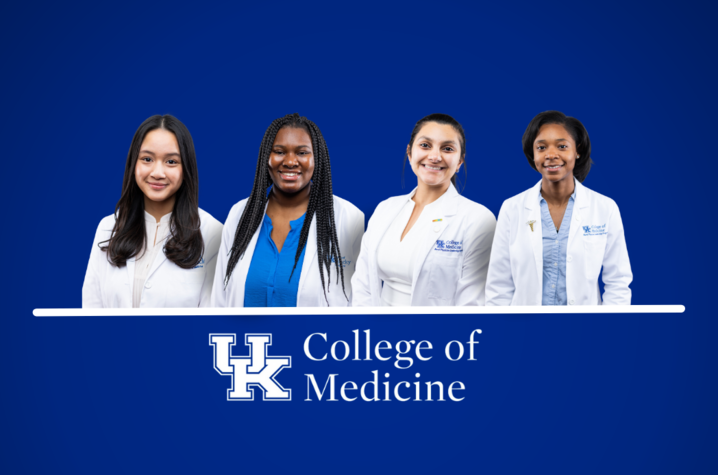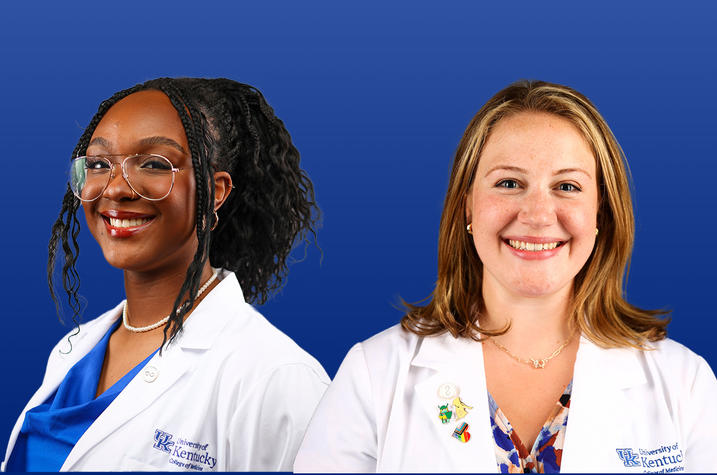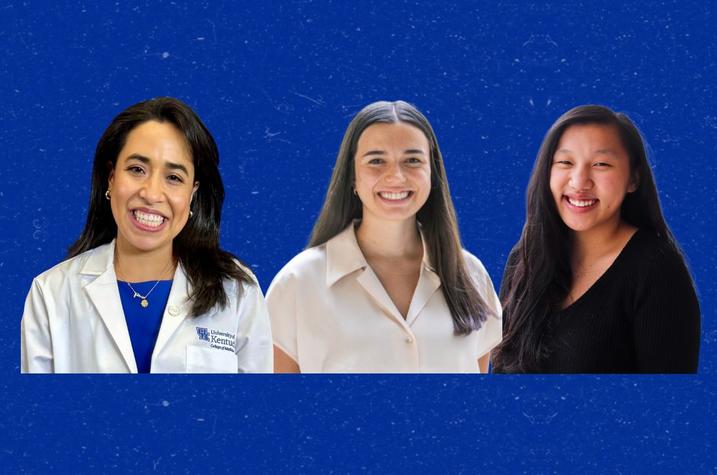Health Disparities Research and Training Fellowship
2025 Application Window: September 22, 2025 - November 21, 2025
Purpose
The UK College of Medicine Department of Behavioral Science (BSC) recognizes the importance of improving health outcomes for all Kentuckians. Additionally, there is a severe national shortage of physician-leaders dedicated to addressing the health needs of Kentucky communities. In response, we are proud to offer the Health Disparities Research and Training Fellowship to qualified first-year medical students. The goal of this fellowship is to enhance students' understanding of health disparities and to better equip them to serve disproportionately impacted Kentuckians.
Fellows
Request for Applications
Apply here by November 21, 2025
Behavioral Science Health Disparities Research and Training Fellowship
Over 18 months (from January of the student’s first year of medical school through the end of the student’s second year) each fellow will work with an identified faculty member in the department of behavioral science to develop a clear, achievable project that addresses alleviating health disparities or enhancing the health and well-being of those disproportionately impacted by health disparities in the U.S. Clinical science, basic science, community engagement, health humanities, or educational intervention projects will be considered.
Award Dates
- Application Submission: Accepting submissions from September 22 - November 21, 2025
- Funding Decisions: Early December 2025
- Fellowship Start Date: January 1, 2026
- Fellowship End Date: June 30, 2027
Award Dates
- Application Submission: Accepting submissions from September 22 - November 21, 2025
- Funding Decisions: Early December 2025
- Fellowship Start Date: January 1, 2026
- Fellowship End Date: June 30, 2027
Eligibility
- Current first-year medical students enrolled at the University of Kentucky in good academic standing are welcome to apply.
- The 18-month fellowship will start January 1, 2026 (spring of the student’s 1st year of medical school) and will end on June 30, 2027 (end of the student’s 2nd year).
- Fellowship awardees will be required to take one course on health disparities during the Spring of their first year (see details below)
Eligibility
- Current first-year medical students enrolled at the University of Kentucky in good academic standing are welcome to apply.
- The 18-month fellowship will start January 1, 2026 (spring of the student’s 1st year of medical school) and will end on June 30, 2027 (end of the student’s 2nd year).
- Fellowship awardees will be required to take one course on health disparities during the Spring of their first year (see details below)
Funding
- Stipend award for personal use in the amount of $5,000; the stipend will be dispersed across two installments ($2,500 in January 2026, $2,500 in June 2026).
- A research award of up to $2,000; IRB or other regulatory approvals (if required for the project) must be obtained in order for the research funds to be released.
Funding
- Stipend award for personal use in the amount of $5,000; the stipend will be dispersed across two installments ($2,500 in January 2026, $2,500 in June 2026).
- A research award of up to $2,000; IRB or other regulatory approvals (if required for the project) must be obtained in order for the research funds to be released.
Research Project
The application requires a one-page description of a research project (in the form of a Specific Aims page, see application instructions below). The research project should focus on an aspect of alleviating health disparities or enhancing the health and well-being of those disproportionately impacted by health disparities. Clinical science, basic science, community-engagement, health humanities, or educational intervention projects will be considered.
Behavioral Science Mentor: Applicants are required to work with a research mentor from the UK Department of Behavioral Science (see current list: Behavioral Science Faculty). The mentor will support the student in developing the application and carrying out the proposed research. Applicants are strongly encouraged to select a PI mentor who has an ongoing project in their area of interest. Applicants should take the lead on reporting a specific outcome, either one that the applicant proposes and can be feasibly incorporated into the mentor’s existing project, or a previously planned outcome that the mentor agrees the applicant can lead.
- Applicants must clearly articulate their role in the project and describe the feasibility of this role. It is not required that the applicant recruit participants, collect, or analyze all data independently. However, the project should reflect a balanced team effort, with the applicant contributing a reasonable and well-defined portion of the work. Together, the student and mentor may develop a new project grounded in the mentor’s expertise, provided it can be translated to address health disparities. Applicants are advised to contact potential mentors early in the application process to discuss research ideas and confirm their willingness to serve as a mentor. If applicants are having difficulty identifying a mentor, please email Dr. Darlingtina Esiaka at dkesiaka@uky.edu for assistance.
Research Project
The application requires a one-page description of a research project (in the form of a Specific Aims page, see application instructions below). The research project should focus on an aspect of alleviating health disparities or enhancing the health and well-being of those disproportionately impacted by health disparities. Clinical science, basic science, community-engagement, health humanities, or educational intervention projects will be considered.
Behavioral Science Mentor: Applicants are required to work with a research mentor from the UK Department of Behavioral Science (see current list: Behavioral Science Faculty). The mentor will support the student in developing the application and carrying out the proposed research. Applicants are strongly encouraged to select a PI mentor who has an ongoing project in their area of interest. Applicants should take the lead on reporting a specific outcome, either one that the applicant proposes and can be feasibly incorporated into the mentor’s existing project, or a previously planned outcome that the mentor agrees the applicant can lead.
- Applicants must clearly articulate their role in the project and describe the feasibility of this role. It is not required that the applicant recruit participants, collect, or analyze all data independently. However, the project should reflect a balanced team effort, with the applicant contributing a reasonable and well-defined portion of the work. Together, the student and mentor may develop a new project grounded in the mentor’s expertise, provided it can be translated to address health disparities. Applicants are advised to contact potential mentors early in the application process to discuss research ideas and confirm their willingness to serve as a mentor. If applicants are having difficulty identifying a mentor, please email Dr. Darlingtina Esiaka at dkesiaka@uky.edu for assistance.
Research Timeline
- January – March 2026: Development of detailed research proposal. After the applicant receives the notice of the research fellowship award, they will spend the first several months of their fellowship fully refining the details of the research project and develop a full, detailed research protocol (along with their Behavioral Science mentor).
- April 1, 2026: Deadline for submission of full research proposal and 3-month check-in. The final detailed research protocol is submitted to the Fellowship Committee for review and feedback. The fellow must provide a 3-month check-in, preferably in person to receive feedback on their research proposal.
- August 2026: Deadline for research project initiation. The project should have received regulatory approval (if needed), and the majority of the data collection should be collected by the start of M2. The project and analyses should remain active through Spring 2026.
- November 2026: Submission of a 1-page progress report. The fellow should submit a summary reporting on their research activities and progress.
- March 2027: Project completed by end of March or the start of dedicated study for STEP.
- May/June 2027: Research presentation. The fellow will create a 15–20-minute presentation to describe the background, methods, and data obtained from their research project. This will be an open forum open to the campus community; friends and family of the applicant are welcome.
- Summer 2027: Brief exit interview via a 30-min Zoom meeting to offer thoughts/suggestions.
Research Timeline
- January – March 2026: Development of detailed research proposal. After the applicant receives the notice of the research fellowship award, they will spend the first several months of their fellowship fully refining the details of the research project and develop a full, detailed research protocol (along with their Behavioral Science mentor).
- April 1, 2026: Deadline for submission of full research proposal and 3-month check-in. The final detailed research protocol is submitted to the Fellowship Committee for review and feedback. The fellow must provide a 3-month check-in, preferably in person to receive feedback on their research proposal.
- August 2026: Deadline for research project initiation. The project should have received regulatory approval (if needed), and the majority of the data collection should be collected by the start of M2. The project and analyses should remain active through Spring 2026.
- November 2026: Submission of a 1-page progress report. The fellow should submit a summary reporting on their research activities and progress.
- March 2027: Project completed by end of March or the start of dedicated study for STEP.
- May/June 2027: Research presentation. The fellow will create a 15–20-minute presentation to describe the background, methods, and data obtained from their research project. This will be an open forum open to the campus community; friends and family of the applicant are welcome.
- Summer 2027: Brief exit interview via a 30-min Zoom meeting to offer thoughts/suggestions.
Fellowship Responsibilities
- **Fellowship awardees are required to enroll in the following elective course during the Spring of their 1st year of medical school – please note that enrollment will be required shortly after fellowship awards are granted.
- Spring 2026: MD 825: Race, Racism and Health Disparities among African Americans in the U.S
- All abstracts, posters, presentations and publications that result from this fellowship should acknowledge the support of the Health Disparities Research & Training Fellowship.
Fellowship Responsibilities
- **Fellowship awardees are required to enroll in the following elective course during the Spring of their 1st year of medical school – please note that enrollment will be required shortly after fellowship awards are granted.
- Spring 2026: MD 825: Race, Racism and Health Disparities among African Americans in the U.S
- All abstracts, posters, presentations and publications that result from this fellowship should acknowledge the support of the Health Disparities Research & Training Fellowship.
Mentor Responsibilities
The primary research mentor must be a faculty member from the department of behavioral science. However, faculty members outside of the department may serve on the applicant's mentorship team (although these additional mentors are not required). Each mentor will assume the responsibility of overseeing the applicant’s research and progress.
The primary mentor is expected to assist the applicant with the following activities:
- Development of the fellowship application and research plan.
- Project implementation, including overseeing data collection and completion of the project.
- Development of full project proposal (due April 1, 2026).
- Completion of progress reports describing the fellow’s progress (written by the fellow with mentor’s input and guidance).
- Preparation of a brief final presentation of the fellow’s project (May/June 2027).
- Completion of a final evaluation of fellow’s progress/exit interview (Summer 2027).
Mentor Responsibilities
The primary research mentor must be a faculty member from the department of behavioral science. However, faculty members outside of the department may serve on the applicant's mentorship team (although these additional mentors are not required). Each mentor will assume the responsibility of overseeing the applicant’s research and progress.
The primary mentor is expected to assist the applicant with the following activities:
- Development of the fellowship application and research plan.
- Project implementation, including overseeing data collection and completion of the project.
- Development of full project proposal (due April 1, 2026).
- Completion of progress reports describing the fellow’s progress (written by the fellow with mentor’s input and guidance).
- Preparation of a brief final presentation of the fellow’s project (May/June 2027).
- Completion of a final evaluation of fellow’s progress/exit interview (Summer 2027).
Application Contents
- Application Form: Complete and sign the application form: HDRT Fellowship Application
Personal Statement: Provide a personal statement of no more than 600 words that describes:
- Any previous service or leadership experience as it relates to alleviating health disparities or enhancing the health and well-being of those disproportionately impacted by health disparities.
- Commitment to addressing health disparities.
- Describe why the Behavioral Science faculty mentor was selected for this project.
- How the HDRT Fellowship will benefit the applicant in their training as a future physician.
- Research Proposal: Submit a 2-page research proposal that includes the following elements:
- Specific aims page (1 page) (examples and general guidance if needed: NIH SA Page)
- Project timeline (approx. ½ page) using the research timeline above as a general guide
- Itemized budget justification (approx. ½ page); $2,000 maximum budget for the duration of the project
Questions regarding allowable costs should be directed to: Alicia Colliver (ajduna0@uky.edu)
Resume or CV: Include educational history, previous/current research activities (if any), employment, and extracurricular activities, and awards/recognitions
- Two letters of recommendation:
- One letter from a previous or current mentor or supervisor who can speak to the applicant’s involvement working with an interest in health disparities research
- One letter from the applicant’s Behavioral Science faculty mentor
- Letters should be submitted on official letterhead and include a signature
- Letters of recommendation should be sent directly to BSCConcert@uky.edu
by the letter’s author. Letters should have the applicant’s name as part of the file name and in the subject line of the email.
Application Contents
- Application Form: Complete and sign the application form: HDRT Fellowship Application
Personal Statement: Provide a personal statement of no more than 600 words that describes:
- Any previous service or leadership experience as it relates to alleviating health disparities or enhancing the health and well-being of those disproportionately impacted by health disparities.
- Commitment to addressing health disparities.
- Describe why the Behavioral Science faculty mentor was selected for this project.
- How the HDRT Fellowship will benefit the applicant in their training as a future physician.
- Research Proposal: Submit a 2-page research proposal that includes the following elements:
- Specific aims page (1 page) (examples and general guidance if needed: NIH SA Page)
- Project timeline (approx. ½ page) using the research timeline above as a general guide
- Itemized budget justification (approx. ½ page); $2,000 maximum budget for the duration of the project
Questions regarding allowable costs should be directed to: Alicia Colliver (ajduna0@uky.edu)
Resume or CV: Include educational history, previous/current research activities (if any), employment, and extracurricular activities, and awards/recognitions
- Two letters of recommendation:
- One letter from a previous or current mentor or supervisor who can speak to the applicant’s involvement working with an interest in health disparities research
- One letter from the applicant’s Behavioral Science faculty mentor
- Letters should be submitted on official letterhead and include a signature
- Letters of recommendation should be sent directly to BSCConcert@uky.edu
by the letter’s author. Letters should have the applicant’s name as part of the file name and in the subject line of the email.
Review Considerations
The Department of Behavioral Science Council on Community, Education, Research and Training (CONCERT) will review all applications. The Council will prioritize candidates who express a commitment to working toward alleviating health disparities or enhancing the health and well-being of those disproportionately impacted by health disparities.
Applications will be evaluated on the following criteria:
- Applicant’s potential to carry out a project that aims to address health disparities.
- Faculty mentor(s) ability to provide adequate mentorship for the proposed project.
- Project feasibility (timeline, scope of data collection, applicant’s previous research experience as it pertains to feasibility).
- Strength of proposed research idea.
Review Considerations
The Department of Behavioral Science Council on Community, Education, Research and Training (CONCERT) will review all applications. The Council will prioritize candidates who express a commitment to working toward alleviating health disparities or enhancing the health and well-being of those disproportionately impacted by health disparities.
Applications will be evaluated on the following criteria:
- Applicant’s potential to carry out a project that aims to address health disparities.
- Faculty mentor(s) ability to provide adequate mentorship for the proposed project.
- Project feasibility (timeline, scope of data collection, applicant’s previous research experience as it pertains to feasibility).
- Strength of proposed research idea.
Questions about the Fellowship
For questions regarding the HDRT Fellowship, please contact Dr. Darlingtina Esiaka at dkesiaka@uky.edu.
Questions about the Fellowship
For questions regarding the HDRT Fellowship, please contact Dr. Darlingtina Esiaka at dkesiaka@uky.edu.
